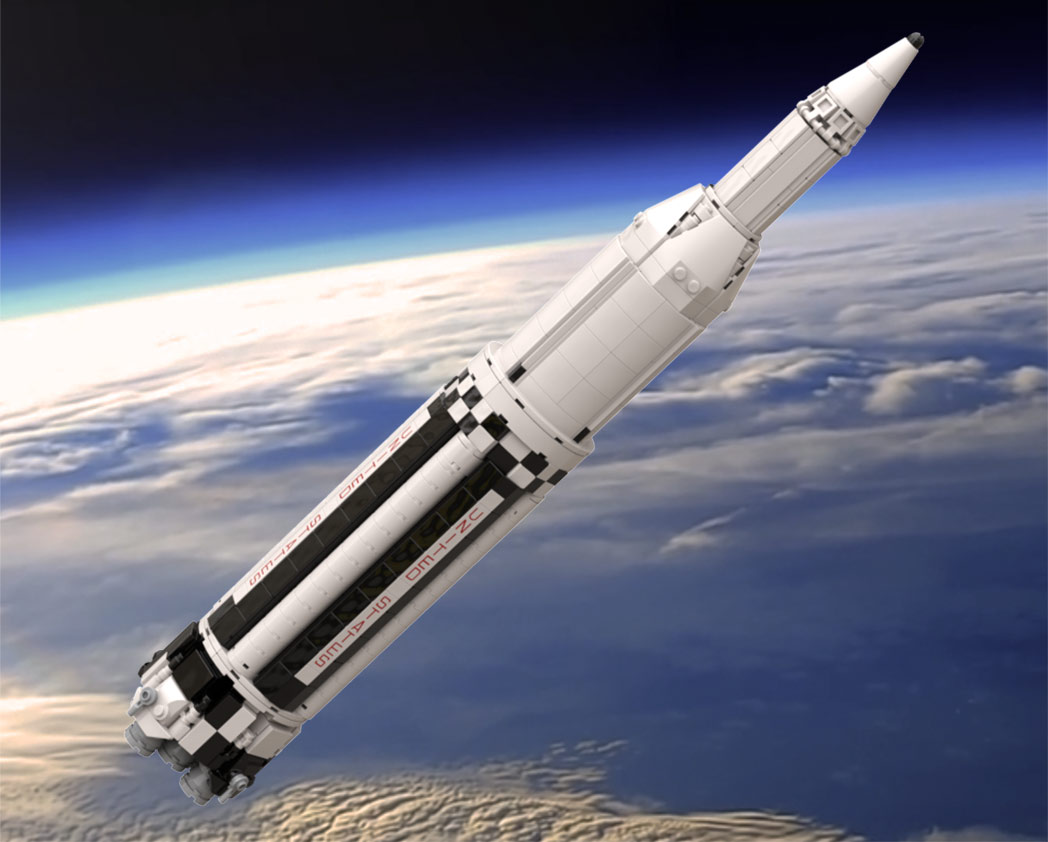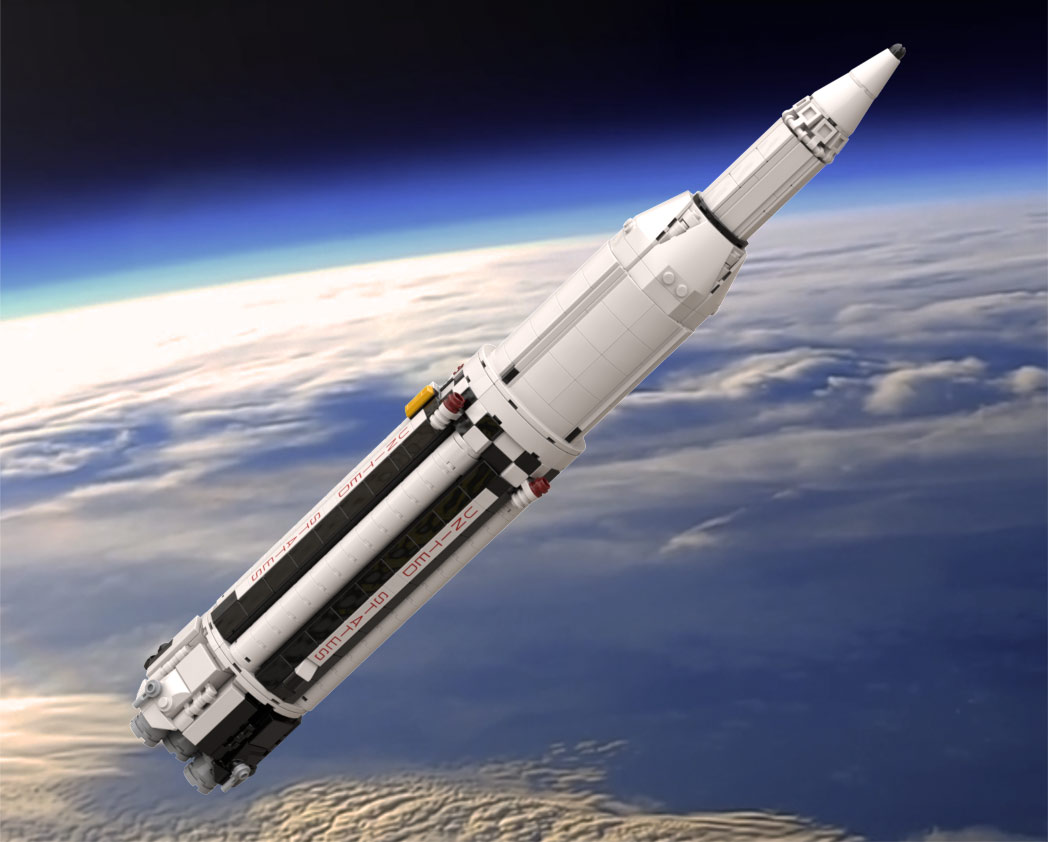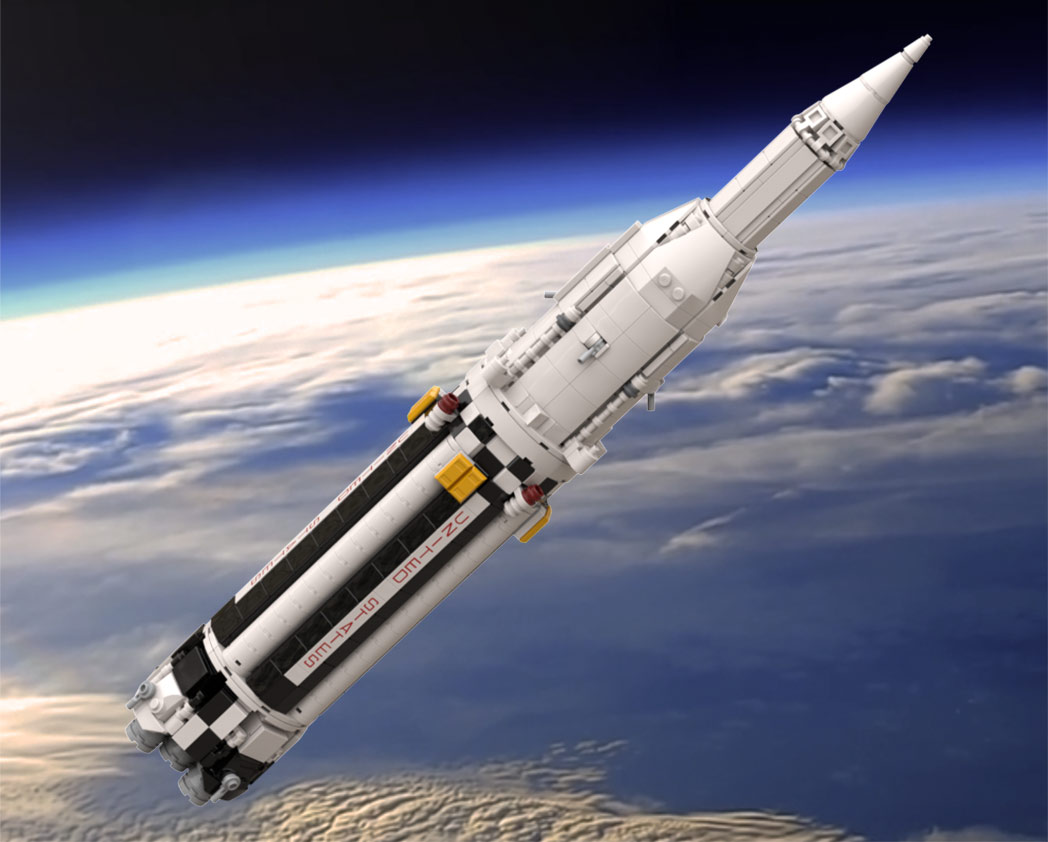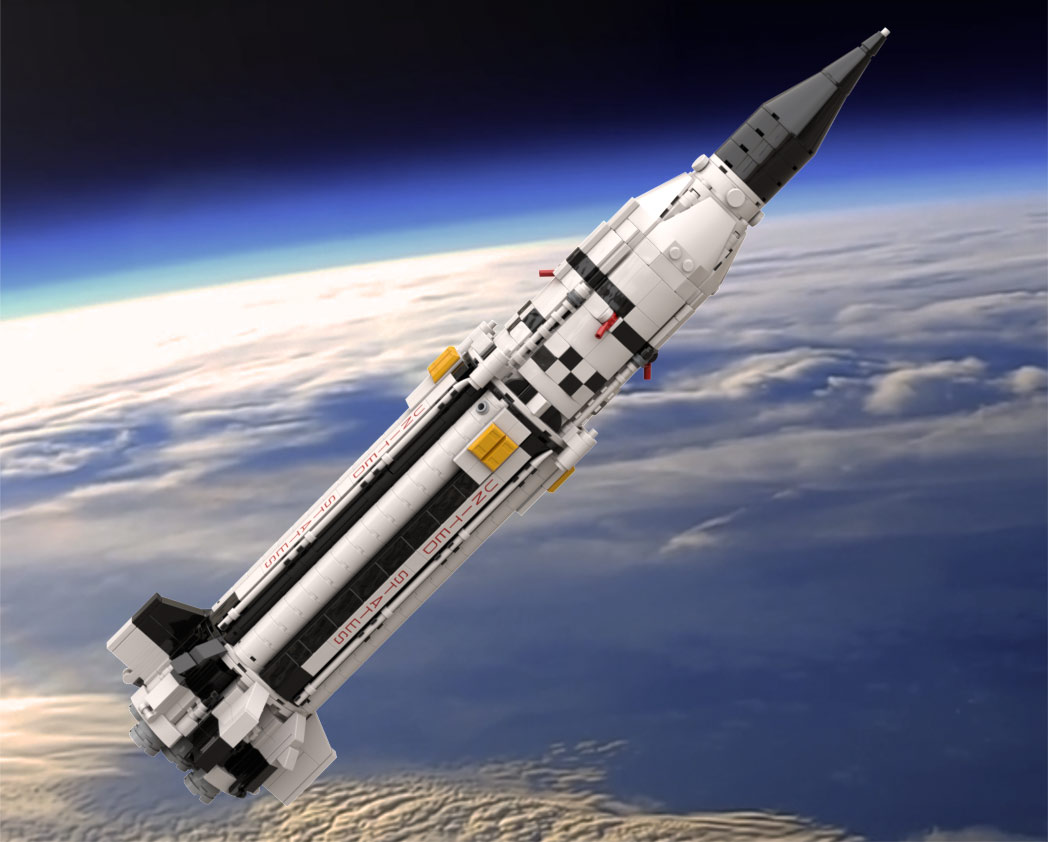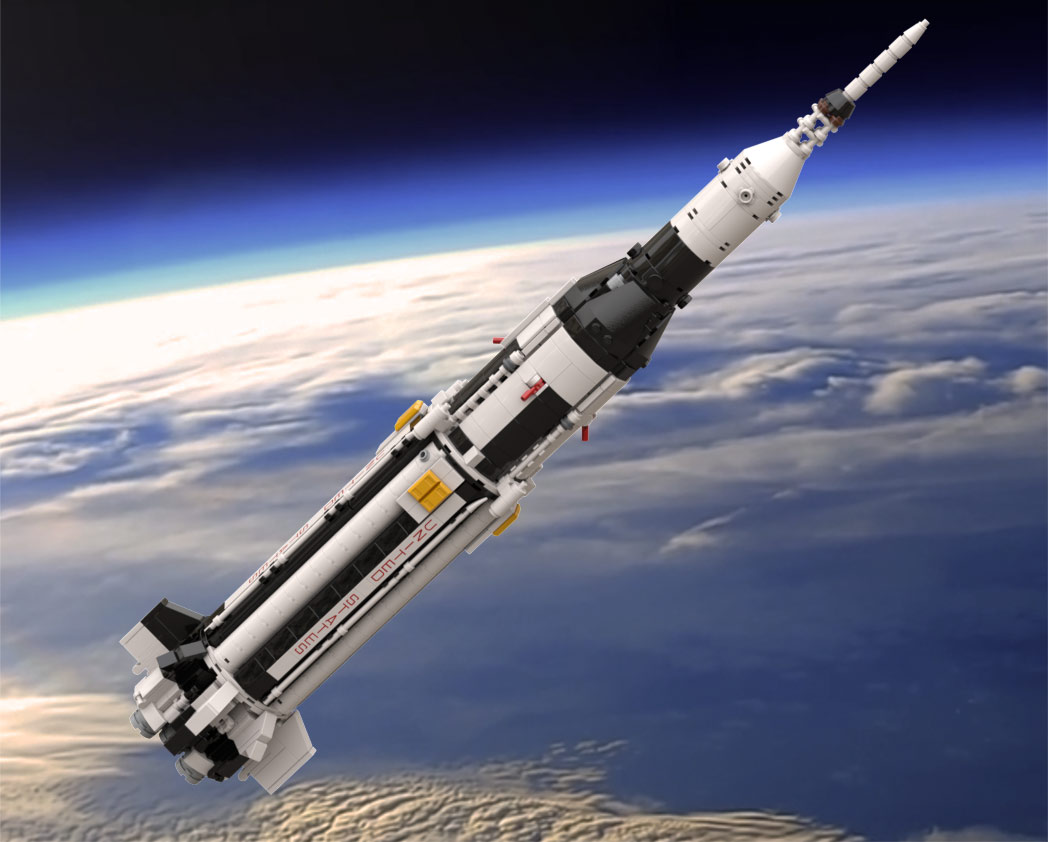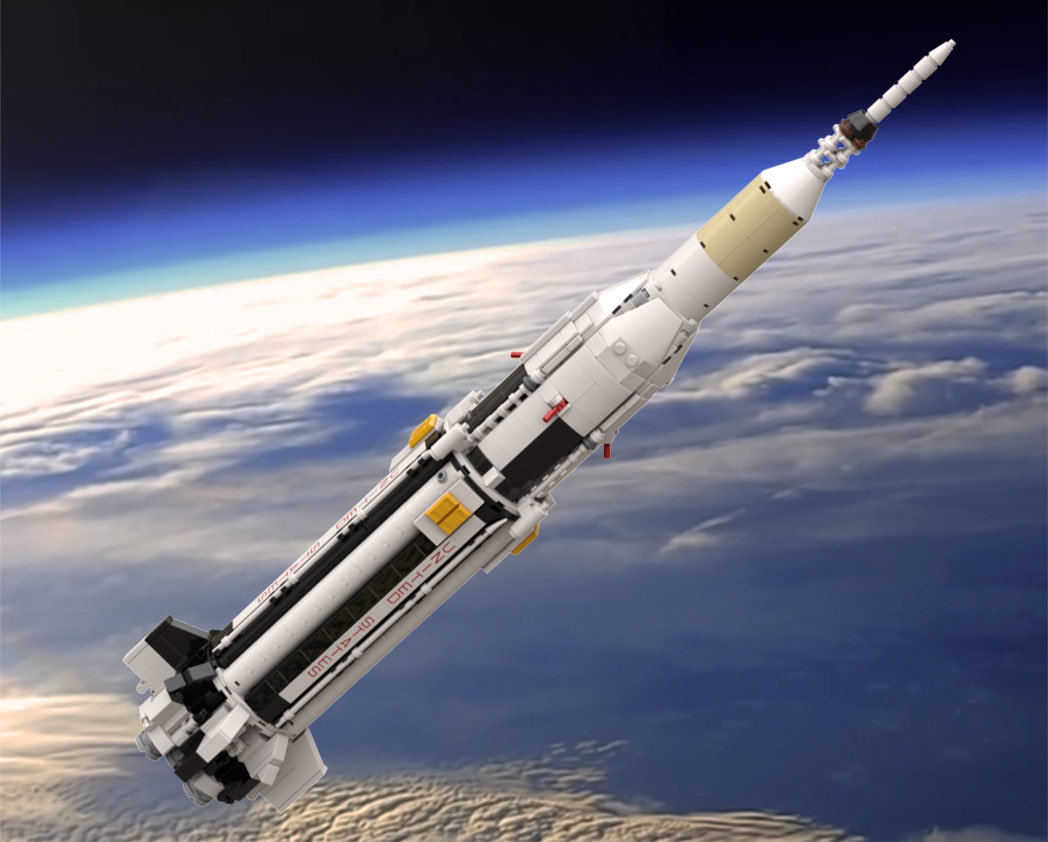
LEGO Designer:
Adam Wilde (Apollo 110)
Designed:
October 2024
Categories:
All, Apollo Program, Launch Vehicles, Medium Lift Launch Vehicle, Space Agency - NASA
Launch Vehicle Details
Stages:
2 stage
Length:
58 m
Diameter:
6.53 m
Mass at Launch:
508 tonnes
Low Earth Orbit Capacity:
9000 kg
Total Thrust:
5768 kN
Apogee:
200 km
Class:
Medium Lift Launch Vehicle
The last Block II Saturn I missions, AS-103 (using launch vehicle SA-9), AS-104 (SA-8) and AS-105 (SA-10) all launched in 1965 and each carried one of three identical Pegasus satellites. These were used to measure the frequency of micrometeoroid impacts in Earth orbit to determine if the shielding designed for the Apollo spacecraft would be adequate to protect them. The satellites remained attached to the spent S-IV second stages, and their 29-metre (96′) wide wings with 104 detection panels were deployed after the boilerplate Apollo Command Module and Service Module had been jettisoned into separate orbits. All three satellites remained operational until 1978.
At 1:110 scale this is a great companion model to the LEGO NASA Apollo Saturn V. Purchase includes a BrickLink Wishlist XML file and carefully prepared instructions with annotations to point out what the various details/sections are.If you would prefer to have the Service Module in White instead of Tan, there’s an XML file for that option too. (In real life, the boilerplate Service Module on these rockets was a slightly creamy off-white, unlike the cleaner white white paint used on the rest of the vehicle. Which is why I’ve used Tan, though that does somewhat exaggerate the contrast between the two shades.)The model includes a stowed Pegasus satellite with a representation of the ‘folded’ wings inside the Service Module, but there’s also an XML file for the extra parts you would need if you wanted to show the S-IV with the Pegasus satellite’s wings deployed. To do that, build using these instructions up to (and including) step 290, then pick up from step 64 of my free instructions for building the Pegasus satelliteLastly, there was one notable difference on SA-8 and SA-10 that I haven’t included (but mention because it’s interesting; well, hopefully interesting) is that for the last two flights a single RCS quad was mounted on the boilerplate Service Module. It wasn’t live, but was instrumented for temperature testing. I’ve omitted it for a few reasons: a) part 6222 isn’t available in Tan; b) even if it was you then have either have weird-looking three holes or if you fill them in with pins and/or tiles/plates, that adds detail that wasn’t there; c) you then couldn’t have the Pegasus payload inside. If you feel differently, feel free to mod your build! (The quad should go on the side directly above the large, all black first stage fin.)Sections of this model are adapted from David Welling’s OG Saturn I MOCs and it also repurposes the Saturn IB tank design devised by saxus, which is used with his kind permission.
Part count: bricks, lots.
| Unit | width | length | height |
|---|---|---|---|
| Studs | |||
| Inches | |||
| Centimetres |
No: TNo: Serial Type Date LS Payload
1 1 SA-1 Saturn-1 (Bl.-1) 27.10.1961 CC LC-34 * (R/D) 2 2 SA-2 Saturn-1 (Bl.-1) 25.04.1962 CC LC-34 * Highwater 1 3 3 SA-3 Saturn-1 (Bl.-1) 16.11.1962 CC LC-34 * Highwater 2 4 4 SA-4 Saturn-1 (Bl.-1) 28.03.1963 CC LC-34 * (R/D) 5 1 SA-5 Saturn-1 (Bl.-2) 29.01.1964 CC LC-37B Saturn-SA 5 6 2 SA-6 Saturn-1 (Bl.-2) 28.05.1964 CC LC-37B Saturn-SA 6 & Apollo 101 (BP 13) 7 3 SA-7 Saturn-1 (Bl.-2) 18.09.1964 CC LC-37B Saturn-SA 7 & Apollo 102 (BP 15) 8 4 SA-9 Saturn-1 (Bl.-2) 16.02.1965 CC LC-37B Pegasus 1 / Apollo 103 (BP 16) 9 5 SA-8 Saturn-1 (Bl.-2) 25.05.1965 CC LC-37B Pegasus 2 / Apollo 104 (BP 26) 10 6 SA-10 Saturn-1 (Bl.-2) 30.07.1965 CC LC-37B Pegasus 3 / Apollo 105 (BP 9A) 11 1 SA-201 Saturn-1B 26.02.1966 CC LC-34 * Apollo 201 (CSM 009) 12 2 SA-203 Saturn-1B 05.07.1966 CC LC-37B Apollo 203 13 3 SA-202 Saturn-1B 25.08.1966 CC LC-34 * Apollo 202 (CSM 011) 14 4 SA-204 Saturn-1B 22.01.1968 CC LC-37B LM 1 (Apollo 5) 15 5 SA-205 Saturn-1B 11.10.1968 CC LC-34 Apollo 7 (CSM 101) 16 6 SA-206 Saturn-1B 25.05.1973 CCK LC-39B Skylab 2 (Apollo SLM-1, CSM 116) 17 7 SA-207 Saturn-1B 28.07.1973 CCK LC-39B Skylab 3 (Apollo SLM-2, CSM 117) / S150 (Galactic X-ray Mapping) 18 8 SA-208 Saturn-1B 16.11.1973 CCK LC-39B Skylab 4 (Apollo SLM-3, CSM 118) 19 9 SA-210 Saturn-1B 15.07.1975 CCK LC-39B ASTP (Apollo-Soyuz, CSM 111) / ASTP-DM Launch sites: CC = Cape Canaveral Air Force Station, Eastern Test Range, Cape Canaveral, Florida, USA CCK = NASA John F. Kennedy Space Center, Cape Canaveral, Florida, USA * = suborbital
Launch History information from space.skyrocket.de
Launch History information from space.skyrocket.de















![59900 Cone 1 x 1 [Top Groove]
in White
Bricks Round and Cones](https://cdn.rebrickable.com/media/thumbs/parts/elements/4518400.jpg/85x85p.jpg?1658326111.3718252)

![2540 Plate Special 1 x 2 Side Handle [Free Ends]
in Light Bluish Gray
Plates Special](https://cdn.rebrickable.com/media/thumbs/parts/elements/4211632.jpg/85x85p.jpg?1658325777.3077912)

![60478 Plate Special 1 x 2 with Handle on End [Closed Ends]
in Black
Plates Special](https://cdn.rebrickable.com/media/thumbs/parts/elements/4515368.jpg/85x85p.jpg?1658325735.1557841)

![2540 Plate Special 1 x 2 Side Handle [Free Ends]
in White
Plates Special](https://cdn.rebrickable.com/media/thumbs/parts/elements/254001.jpg/85x85p.jpg?1681644255.4429228)









![59900 Cone 1 x 1 [Top Groove]
in Flat Silver
Bricks Round and Cones](https://cdn.rebrickable.com/media/thumbs/parts/elements/6121350.jpg/85x85p.jpg?1658325774.7917907)

![60478 Plate Special 1 x 2 with Handle on End [Closed Ends]
in White
Plates Special](https://cdn.rebrickable.com/media/thumbs/parts/elements/4515364.jpg/85x85p.jpg?1658326103.1398244)

![60470b Plate Special 1 x 2 with Clips Horizontal [Open O Clips]
in Black
Plates Special](https://cdn.rebrickable.com/media/thumbs/parts/elements/6310268.jpg/85x85p.jpg?1703799618.107761)




![15672 Slope 45° 2 x 1 with 2/3 Cutout [New Version]
in Black
Bricks Sloped](https://cdn.rebrickable.com/media/thumbs/parts/elements/4653087.jpg/85x85p.jpg?1658325809.4157965)
![61252 Plate Special 1 x 1 with Clip Horizontal [Thick Open O Clip]
in Black
Plates Special](https://cdn.rebrickable.com/media/thumbs/parts/elements/6308000.jpg/85x85p.jpg?1707976677.55872)

![60478 Plate Special 1 x 2 with Handle on End [Closed Ends]
in Light Bluish Gray
Plates Special](https://cdn.rebrickable.com/media/thumbs/parts/elements/4515369.jpg/85x85p.jpg?1658325777.3237913)




![32000 Technic Brick 1 x 2 [2 Pin Holes]
in Tan
Technic Bricks](https://cdn.rebrickable.com/media/thumbs/parts/elements/4143352.jpg/85x85p.jpg?1658325974.4038138)





![60470b Plate Special 1 x 2 with Clips Horizontal [Open O Clips]
in White
Plates Special](https://cdn.rebrickable.com/media/thumbs/parts/elements/6347287.jpg/85x85p.jpg?1707976681.758816)









![11477 Slope Curved 2 x 1 No Studs [1/2 Bow]
in White
Bricks Curved](https://cdn.rebrickable.com/media/thumbs/parts/elements/6034044.jpg/85x85p.jpg?1658325897.2278087)



![15672 Slope 45° 2 x 1 with 2/3 Cutout [New Version]
in White
Bricks Sloped](https://cdn.rebrickable.com/media/thumbs/parts/elements/6069002.jpg/85x85p.jpg?1658327110.3039544)
![61252 Plate Special 1 x 1 with Clip Horizontal [Thick Open O Clip]
in White
Plates Special](https://cdn.rebrickable.com/media/thumbs/parts/elements/6347293.jpg/85x85p.jpg?1707976979.2055995)
















![99563 Tile Special 1 x 2 with Sloped Walls AKA Money / Gold Bar [Ingot]
in Bright Light Orange
Tiles Special](https://cdn.rebrickable.com/media/thumbs/parts/elements/6236454.jpg/85x85p.jpg?1658325939.4078114)












![11477 Slope Curved 2 x 1 No Studs [1/2 Bow]
in Black
Bricks Curved](https://cdn.rebrickable.com/media/thumbs/parts/elements/6047276.jpg/85x85p.jpg?1658325735.2277842)



















![4081b Plate Special 1 x 1 with Clip Light, Bar Hole [Thick Ring]
in White
Plates Special](https://cdn.rebrickable.com/media/thumbs/parts/elements/408101.jpg/85x85p.jpg?1658325890.4158084)























































![15332 Fence Spindled 1 x 4 x 2 [4 Top Studs]
in Red
Bars, Ladders and Fences](https://cdn.rebrickable.com/media/thumbs/parts/elements/6329920.jpg/85x85p.jpg?1658333272.7805984)












![87081 Brick Round 4 x 4 [Centre Hole]
in White
Bricks Round and Cones](https://cdn.rebrickable.com/media/thumbs/parts/elements/4558956.jpg/85x85p.jpg?1658325782.583792)

![3943b Cone 4 x 4 x 2 with Axle Hole [Plain]
in White
Bricks Round and Cones](https://cdn.rebrickable.com/media/thumbs/parts/elements/394301.jpg/85x85p.jpg?1703930183.040849)










